|
|
|
|
|
|
|
|
|
Award Number and Duration |
|
|
|
NSF OAC 2313124 (University of Utah) |
|
|
|
PI and Point of Contact |
|
|
|
Bei Wang Phillips (PI, University of Utah)
Xin Liang (Lead PI, University of Kentucky)
Hanqi Guo (PI, Ohio State University) |
|
|
|
Overview |
|
|
|
Today's large-scale simulations are producing vast amounts of data that are revolutionizing scientific thinking and practices. As the disparity between data generation rates and available I/O bandwidths continues to grow, data storage and movement are becoming significant bottlenecks for extreme-scale scientific simulations in terms of in situ and post hoc analysis and visualization. Such a disparity necessitates data compression, where data produced by simulations are compressed in situ and decompressed in situ and post hoc for analysis and exploration. Meanwhile, topological data analysis plays an important role in extracting insights from scientific data regarding feature definition, extraction, and evaluation. However, most of today’s lossy compressors are topology- agnostic, i.e., they do not guarantee the preservation of topological features essential to scientific discoveries. This project aims to research and develop advanced lossy compression techniques and softwares that preserve topological features in data for in situ and post hoc analysis and visualization at extreme scales. The data of interest are scalar fields and vector fields that arise from scientific simulations, with driving applications in cosmology, climate, and fusion simulations. |
|
|
|
Broader Impacts |
|
|
|
This project brings together application scientists, visualization experts, and compression re- searchers to advance research and eduction in advanced cyberinfrastructure. The PIs will integrate the research results into teaching and recruit talented students to participate in collaborative research initiatives with leading domain scientists. The team will broaden the participation of underrepresented groups and K-12 students through ongoing collaborations on university campuses. Workshops will be organized at visualization and high-performance computing conferences for broad dissemination. In particular, data challenges will be integrated within workshops to help onboard members from science and engineering communities to engage in joint developmental efforts. |
|
|
|
Publications and Manuscripts |
|
|
| Manuscripts | |

|
Multi-Tier Preservation of Discrete Morse-Smale Complexes in Error-Bounded Lossy Compression.
Yuxiao Li, Mingze Xia, Xin Liang, Bei Wang, Hanqi Guo. Manuscript, 2025. |
| Year 2 (2024 - 2025) | |

|
 TFZ: Topology-Preserving Compression of 2D Symmetric and Asymmetric Second-Order Tensor Fields.
TFZ: Topology-Preserving Compression of 2D Symmetric and Asymmetric Second-Order Tensor Fields.
Nathaniel Gorski, Xin Liang, Hanqi Guo, Bei Wang. IEEE Visualization Conference (IEEE VIS), 2025. IEEE Transactions on Visualization and Computer Graphics, to appear, 2025. Supplement. |
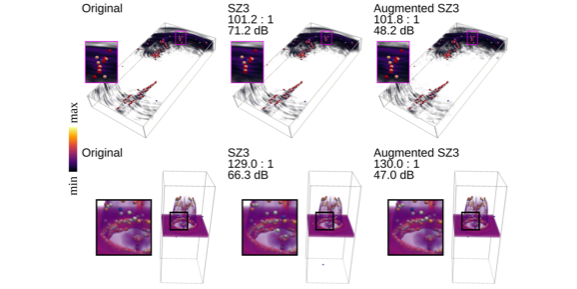
|
 A General Framework for Augmenting Lossy Compressors with Topological Guarantees.
A General Framework for Augmenting Lossy Compressors with Topological Guarantees.
Nathaniel Gorski, Xin Liang, Hanqi Guo, Lin Yan, and Bei Wang. IEEE Pacific Visualization Symposium (PacificVis) TVCG Journal Track, 2025. IEEE Transactions on Visualization and Computer Graphics, 31(6), pages 3693-3705, 2025. DOI: 10.1109/TVCG.2025.3567054 |
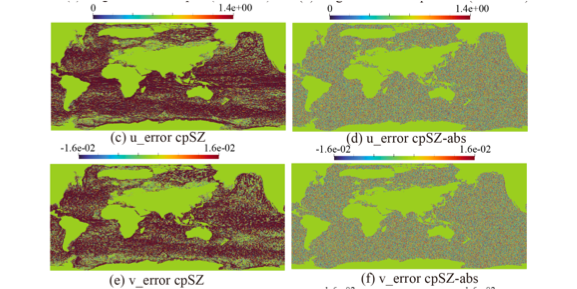
|
 TspSZ: An Efficient Parallel Error-Bounded Lossy Compressor for Topological Skeleton Preservation.
TspSZ: An Efficient Parallel Error-Bounded Lossy Compressor for Topological Skeleton Preservation.
Mingze Xia, Bei Wang, Yuxiao Li, Pu Jiao, Xin Liang, Hanqi Guo. Proceedings of the 41st IEEE International Conference on Data Engineering (ICDE), pages 3682-3695, 2025. DOI: 10.1109/ICDE65448.2025.00275 |
| Year 1 (2023 - 2024) | |
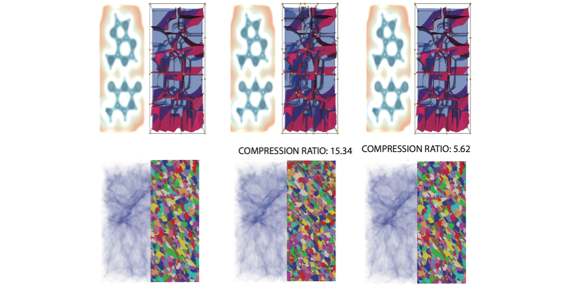
|
 MSz: An Efficient Parallel Algorithm for Correcting Morse-Smale Segmentations in Error-Bounded Lossy Compressors.
MSz: An Efficient Parallel Algorithm for Correcting Morse-Smale Segmentations in Error-Bounded Lossy Compressors.
Yuxiao Li, Xin Liang, Bei Wang, Yongfeng Qiu, Lin Yan, Hanqi Guo. IEEE Visualization Conference (IEEE VIS), 2024. IEEE Transactions on Visualization and Computer Graphics, 31(1), pages 130-140, 2025. Supplement 1. Supplement 2: Detailed figures from Figure 7 and Figure 8 in the main paper. DOI: 10.1109/TVCG.2024.3456337 arXiv:2406.09423 |
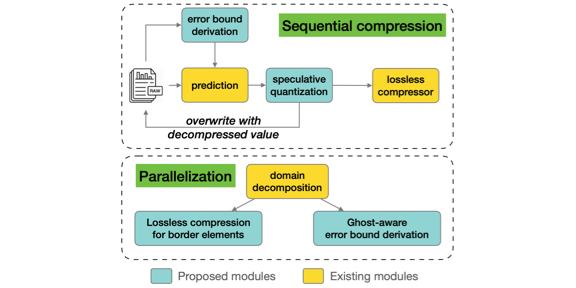
|
 Preserving Topological Feature with Sign-of-Determinant Predicates in Lossy Compression: A Case Study of Vector Field Critical Points.
Preserving Topological Feature with Sign-of-Determinant Predicates in Lossy Compression: A Case Study of Vector Field Critical Points.
Mingze Xia, Sheng Di, Franck Cappello, Pu Jiao, Kai Zhao, Jinyang Liu, Xuan Wu, Xin Liang, Hanqi Guo. Proceedings of the 40th IEEE International Conference on Data Engineering (IEEE ICDE), 2024. DOI: 10.1109/ICDE60146.2024.00378 |
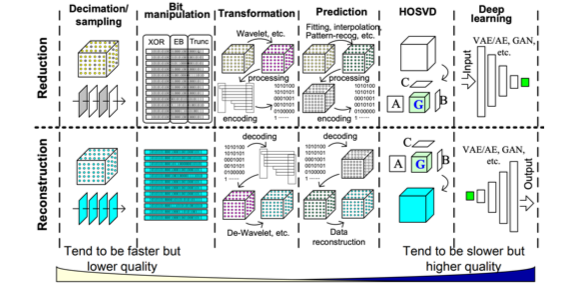
|
 CliZ: Optimizing Lossy Compression for Climate Datasets with Adaptive Fine-tuned Data Prediction.
CliZ: Optimizing Lossy Compression for Climate Datasets with Adaptive Fine-tuned Data Prediction.
Zizhe Jian, Sheng Di, Jinyang Liu, Kai Zhao, Xin Liang, Haiying Xu, Robert Underwood, Jiajun Huang, Shixun Wu, Zizhong Chen, Franck Cappello. Proceedings of the 38th IEEE International Parallel and Distributed Processing Symposium (IEEE IPDPS), 2024. DOI: 110.1109/IPDPS57955.2024.00044 |
|
|
|
Presentations, Educational Development and Broader Impacts |
|
|
| Year 2 (2024 - 2025) |
|
| Year 1 (2023 - 2024) |
|
|
|
|
Students |
|
|
|
Nathaniel Gorski (U of Utah, CS PhD student) |
|
|
|
Acknowledgement |
|
|
|
This material is based upon work supported or partially supported by the National Science Foundation under Grant No.2313124. |
|
|